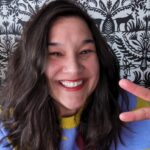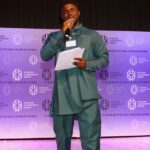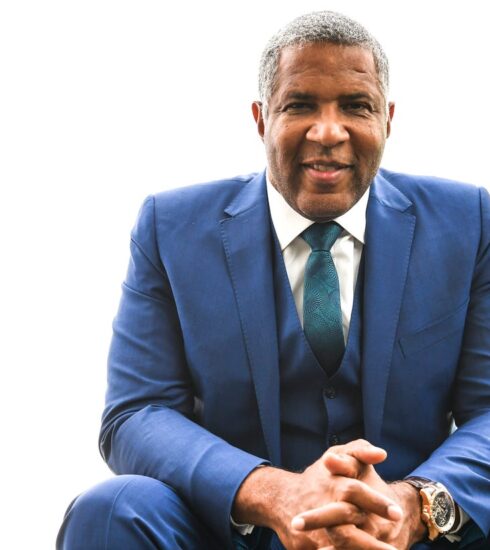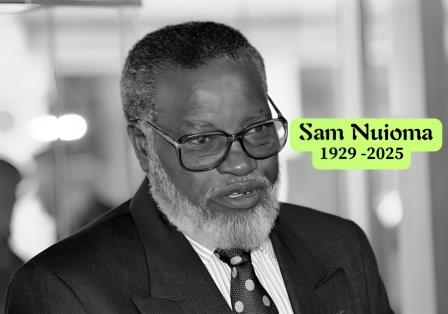“You Have to Fight”: Florence Takang’s 14-Year Journey with Breast Cancer
______________________________________________________________________________________________
“You have to fight. You have to speak up. You have to believe in miracles. And when you’re in pain, don’t just reach for medicine—reach for someone who will listen. Reach for God.”
— Florence Takang, Breast Cancer Survivor
________________________________________________________________________________________________________
Introduction
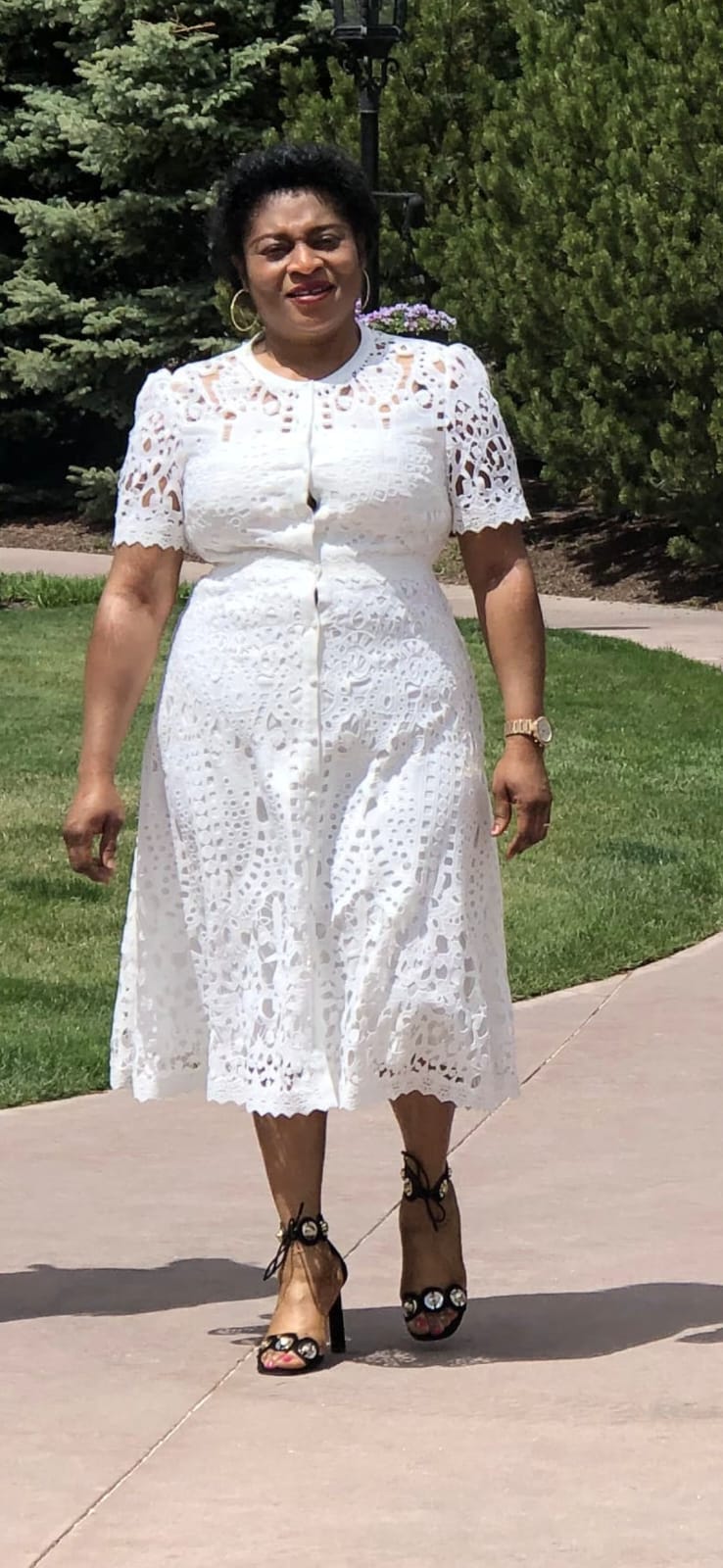
Every October, we pause to honor the women whose lives have been reshaped by breast cancer, those who fight quietly, those who speak boldly, and those whose scars carry stories of survival. At Afrik Digest, we believe that storytelling is a form of healing. This month, we bring you the extraordinary journey of Florence Takang, a Cameroonian mother, believer, and fierce advocate who has been living with breast cancer for over 14 years.
Diagnosed in 2011, Florence’s path has been anything but linear. From misdiagnoses in Cameroon to a double mastectomy in Colorado, from moments of despair to the miracle of motherhood, her story is proof of her resilience, intuition, and the power of community. She opens up about the emotional toll of being dismissed, the rituals that sustain her, and the courage it takes to keep choosing life.
This is not just a medical story, it’s a spiritual one. It’s about listening to your body, trusting your voice, and finding light in the darkest hours. For every woman who has felt afraid, unseen, or alone, Florence’s journey is a reminder: you are not forgotten. You are not powerless. You are not done.
A Mother First: The Heart Behind the Fight
“I just love being a mom,” Florence Takang says with a quiet smile. It’s a simple statement, but behind it lies a story of fierce resilience, medical missteps, and a woman’s unwavering determination to be heard.
Florence, a 47-year-old Cameroonian mother of two, has been battling breast cancer for over 14 years. Diagnosed in 2011, her journey began long before that, in hospital rooms back home in Cameroon, where persistent fevers were dismissed as malaria. “They blamed it on mosquitoes,” she recalls. “The symptoms would go away briefly, then pop back up. It was on and off, and no one could explain why.”
But Florence’s body kept speaking. She began noticing stains on her nightgown—fluid seeping from her left breast, “like apple juice,” she says. At the time, breast cancer was not part of her vocabulary. “We were ignorant. We didn’t know what it was. So we just brushed it away.”
The Danger of Misdiagnosis
Eventually, she pressed her own breast and saw the fluid ooze out. That moment marked the beginning of a long and painful search for answers. Her primary physician in Cameroon prescribed hormonal medications, offering temporary relief. When symptoms returned, he tried trial drugs. “It was like we were playing guessing games,” Florence says.
In 2003, she moved to Colorado, where her father had filed for her immigration. But the symptoms followed. She sought help through Kaiser Permanente, and again, her concerns were minimized. “I told the gynecologist that the fluid now had blood in it. He said it didn’t. I insisted. We argued. Finally, he took a sample and looked under the microscope. He came back and said, ‘Ma’am, I’m so sorry. You were very, very correct.’”
That moment, when Florence’s voice was finally validated, was bittersweet. She was referred for an ultrasound, but the results took two months to arrive. “I watched the technician’s face during the scan. Her expressions told me something was wrong, but she said, ‘Only the doctor can give you the results.’”
Eventually, she was told it was a cyst. Relieved, she agreed to surgery at the Franklin building. But Florence, ever intuitive, asked for a biopsy. The surgeon refused. “He said, ‘It’s just a cyst. There’s nothing, ma’am.’ I asked, ‘Can I trust you?’ He said yes.”
She left the hospital with lingering doubts. “That’s a lesson,” she says now. “My advice to fellow women: do your homework. Ask questions. Fight. You have to fight. You have to talk to your doctors. Get somebody who will listen to you.”
Florence’s story is not just about misdiagnosis—it’s about the emotional toll of being dismissed, the cultural gaps in healthcare, and the strength it takes to keep advocating for yourself. After giving birth to her son in 2011, she was told she could never breastfeed from her left side. But sensations returned in both breasts, and again, her concerns were brushed aside as hormonal.
“I didn’t want to think of anything. I didn’t want to feel otherwise,” she says. But her body kept speaking. And Florence kept listening.
Florence’s diagnosis came just four months after giving birth to her son. She was still healing from a C-section when she noticed a stinging sensation in her left breast. Unable to breastfeed from her right side, she tried pumping from her left. What came out was blood.
“My heart started pounding,” she recalls. “I pushed the breast to feel it. It was hard. Some parts were tender. Then I felt this huge lump, like something that had developed overnight.”
She had been at the hospital just a week before, reporting tingling sensations. No lumps had been detected. Now, alone at home, she could feel it herself. She scheduled an urgent ultrasound. The results took a month.
The Moment Everything Changed
“I was bathing my baby when the nurse called. She asked, ‘Are you in a safe place?’ That’s when I knew something was wrong.”
Florence sat in her breastfeeding chair, placed her baby safely on the bed, and listened. “She said, ‘You have breast cancer.’ I dropped to the floor and burst out crying.”
She called her sister in California, who didn’t pick up. Then she called her husband, who was at the African grocery store. “He got so confused, he forgot the things he bought. He even almost forgot to enter his car and started walking home on foot.”
The diagnosis was devastating. Florence had just become a mother again. “The first thing that came to my mind was death. I thought I was going to die and leave this little guy who needed me most.”
She underwent an MRI in Broomfield at 4:30 a.m. the next day. “I was in that machine for three hours. It wasn’t easy.” The biopsy confirmed cancer in the left breast and a lump in the right. Her family began shuttling between hospitals: Rocky Mountain Cancer Center, Aurora Medical Center, and University of Colorado Hospital. But Florence knew she needed stability. “I told my husband, let’s not be confused. Let’s focus on Kaiser and do whatever they ask us to do.”
Her strength came from her son. “I was tapping my strength mostly from my baby. I knew I had to be strong to take care of him.” When it came time to discuss treatment, the doctor hesitated. “She was rambling. She didn’t know how to tell me I needed a double mastectomy. I said, ‘Ma’am, just say it. Don’t be scared.’”
The doctor explained that many patients refused treatment and didn’t survive. Florence didn’t flinch. “I said, ‘Tell me. I’m equal to the task.’”
Treatment Begins: MRI, Biopsy, and the Decision to Fight
Florenc agreed to the double mastectomy and chemotherapy. “I have a baby to take care of,” she said. The surgery began at 6:45 a.m. with a team of eight doctors and ended at 7 p.m. Both breasts were removed.
Recovery was grueling. Florence’s sister came to help for a week and offered to take the baby to California. Florence refused. “If you take the baby, then I have no reason to wake up in the morning,” she told her. “If I didn’t have my baby, my health would deteriorate very quickly.”
Friends rallied around her. They came early to bathe her, care for the baby, clean the house, do laundry, and cook meals that met her strict dietary needs. “That is how much help I had,” she says, her voice full of gratitude.
After her double mastectomy, Florence spent two weeks in the hospital. Doctors wanted her to stay longer, but feared infection. “They sent me home with open wounds,” she says. Nurse practitioners visited weekly to drain tubes and monitor healing. On the days they didn’t come, Florence did it herself.
One day, while showering, she felt a burning pain. “I looked in the mirror and saw the cut on my left breast was completely open. No stitches, just sterile strips. I could see inside my body. I saw the implants, the tubes. I closed my eyes, took a deep breath, and treated it myself.”
Her husband had to work. Florence was home alone with her baby, unable to lift more than eight pounds. “I had ten king-size pillows on the bed, so when my baby rolled, he’d land softly. He was a big, chubby baby. I couldn’t use my hands. I had to make food for him. That’s what kept me going.”
When she needed to cry, she went to the bathroom. “I didn’t want my baby to see me cry. He was sensitive. He’d look at me and then bend his head down, like he knew something was wrong.”
Florence’s early symptoms, body aches, joint pain, fatigue, loss of appetite, and recurring fevers, were often dismissed. But her sister remained a steady support, calling daily to pray and check in. Friends suggested alternative remedies. “I still take soursop leaves as tea,” Florence says. “Natural remedies help, but healing is also about your state of mind. You have to stay positive.”
When anxiety crept in, Florence found ways to cope. “I’d call someone and talk. If I were alone, I’d start pacing. At 1 a.m., I’d be doing laundry, cleaning the kitchen, and cooking. My husband knew not to stop me. He’d just ask, ‘Do you need help?’ and then let me be.”
She avoided breast cancer stories on TV. “Sometimes I’m still in denial. It hurts when I hear someone has died of breast cancer. I ask myself, ‘How come I’m still alive?’ It means I still have a purpose. God kept me alive for a reason.”
This interview, she says, is the first time she’s spoken so openly since 2011. “This conversation is therapy. I’ve never gone this deep before.”
There Comes a Miracle: A Purpose Preserved
After being told she could never have another child, Florence became pregnant. “I said, ‘No, I can’t be pregnant.’ But the doctor showed me the ultrasound. There was a heartbeat.”
Her oncologist insisted the pregnancy be terminated, fearing hormone stimulation would trigger the cancer. But her gynecologist disagreed. “He asked the oncologist, ‘Do you go to church?’ She said yes. He said, ‘Do you believe in miracles?’ Then he turned to me and said, ‘Florence, you’re Catholic too. Let’s keep our fingers crossed.’”
The gynecologist signed a waiver accepting full responsibility. Florence began hospital visits six days a week for seven months. “One day, I told the doctor, ‘I’m tired. I’ve been counting my fingers.’ Then he said, ‘Then start counting your toes. Or the hairs on your head.’” At seven months and two weeks, Florence delivered her baby via C-section.
Florence Takang’s story is one of pain, persistence, and profound faith. It’s a reminder that resilience isn’t just about surviving, it’s about choosing to live, to love, and to believe in miracles even when the odds say otherwise.
“I still have a purpose,” she says. “There’s something God wants me to do that I haven’t done yet. And I’m still waiting.”
Florence has endured more than most can imagine. During her double mastectomy, doctors discovered cancerous lumps on her back. “Both sides of my back were ripped open,” she says. “Muscles were moved. It felt like my chest was being pulled apart. That pregnancy was taking a toll on my body. But that’s how I got my miracle baby.”
Her story is not just one of survival. Her story shows the power of motherhood, faith, and self-advocacy. Her children are her daily inspiration. “Even when I couldn’t lift a finger, I had to get up and find food for them.”
I’m still here. And every scar tells a story
Years later, she began experiencing severe stomach pain, “like fire in my belly.” Her trusted gynecologist had retired, so Florence turned to online research, carefully vetting specialists by experience and patient reviews. Her care team became a constellation: oncologists at St. Joseph Cancer Center, a gynecologist at Parker Aventis, and a plastic surgeon at University of Colorado Hospital.
“I choose them wisely,” she says. “You want someone who listens when you talk.”
Her new gynecologist discovered cysts covering her fallopian tubes. “He said most breast cancer patients have their uterus taken out because it tends to spread. So we took out my tubes in 2023.” Florence sighed, “By the time I die, everything will be taken out. But to me, it’s still the healing process. My doctor says, ‘This is how we keep fighting.’”
There were moments when Florence wanted to stop. “I told my doctor, ‘I’m tired.’ He said, ‘You’ve come too far. You can’t give up.’” In November 2024, she underwent radiation for a new lump in her chest, twice a week for a month. “Guess what? I’m still here. And every scar tells a story. Every day, I try to stay positive and prayerful. Every day is a blessing.”
Pain, she says, has taught her to appreciate good health. “Pain is not a bad thing. It’s a form of reflection. You only appreciate good health when you’ve been sick.”
Florence finds strength in humor and connection. At the cancer center, she once sat laughing with nurses when a fellow patient asked, “Why are you here? You’re smiling.” Florence held her hand and said, “You don’t have to be sad. You can smile too. Crying drains you. Say something positive. Laugh.”
Responsive Care: When Doctors Listen
Her medical team has been deeply supportive. “They always listen. They let me choose my treatment times. If I leave a voicemail, someone calls me back by morning. They’ve never dismissed me.”
But she knows not everyone has that positive experience. “It’s not their fault. It’s who they meet. That’s why I tell people: do your homework. Ask the right questions. Advocate for yourself.”
Despite being treated mostly by white doctors, Florence says she never felt marginalized. “Only one of my doctors was African American. But I’ve never felt disrespected. Never.”
Cancer, she says, has made her courageous. “The courage I have now, I didn’t have before. My mom used to say, ‘You haven’t seen it all if you’re still alive.’ But I’ve seen a lot to say, I’ve seen everything.”
Spiritual Wisdom
Florence Takang’s nights are sacred. Faith has been her anchor. “I’m Catholic. My church group supports me. Priests pray with me over the phone. They remind me: nothing is more than God.”
“You have to fight. You have to speak up. You have to believe in miracles. And when you’re in pain, don’t just reach for medicine, reach for someone who will listen. Reach for God.”
While the world sleeps, she listens to herself, to the universe, to the spiritual realm she believes governs the physical. “I don’t burn candles,” she says, “but at night, that’s when I talk to the universe. That’s when I ask for things. That’s when I meditate.”
Though she attends church and finds strength in her Catholic faith, Florence’s spirituality is expansive. “I believe so much in nature. I believe the spiritual controls the physical. During the day, the vibration of the world is too loud. But at night, when everything is quiet, I can communicate.”
Her spiritual clarity has guided her through moments of doubt and decisions that saved her life. When her cousin, also diagnosed with breast cancer, refused a double mastectomy and later passed away, Florence chose to face the surgery head-on. “She was the only other person in my extended family with cancer. After my diagnosis, my sister got tested for the BRCA gene. Thankfully, she was negative.”
Weird Misconceptions
Florence also challenges common misconceptions. “I was 33 when I was diagnosed. Some people think breast cancer only affects older women or those with large breasts. That’s not true. I met women younger than me. I met a woman with small breasts. Cancer doesn’t discriminate.”
Support came from unexpected places. “I don’t even know how some groups found me. They sent pillows to protect my chest after surgery, wigs I didn’t need, and headscarves. My husband paid extra for cooling caps during chemo so I wouldn’t lose all my hair. I wore my head ties proudly.”
Her advice to newly diagnosed women is simple and profound: “Stay strong. Stay prayerful. Surround yourself with positive people. It’s not just about pills or injections. It’s about staying positive. Go for walks. Visit friends. Talk. Laugh.”
Florence now mentors a friend in California who’s undergoing chemo. “We talk every other day. I told her, ‘When you’re tired, sleep. When you wake up and feel like talking, call me, any hour.’”
To young girls reading her story, Florence offers this: “Healing isn’t just medication. It’s kindness. It’s showing up. Drive someone to an appointment. Cook for them. Don’t wait for them to ask; some people don’t know how. I’m one of those people. I’ll just start crying when someone offers help. That’s my way of saying, ‘I’ve needed this for so long.’”
She praises friends like Gwen, who show up unannounced, scoop up the kids, and say, “What’s going on?”
Listen to Your Body: The Wisdom of Intuition
Her greatest lesson? “Listen to your body. Only you know when something’s wrong. When I saw blood and the doctor didn’t, I said, ‘It’s my body.’ You have to advocate for yourself.”
Florence urges women to check themselves often. “Don’t wait for your yearly exam. Check in the shower. Ask your partner to help. Look for changes. Even a headache could mean something. I’ve had headaches that led to full-body scans. One time, it was a ruptured implant.”
She’s candid about her care preferences. “I don’t care if my doctor is male or female. I care about experience. Some of the gentlest, most respectful providers I’ve had were men. And no question is stupid. Pour out everything you’re feeling. Let them figure it out.”
Florence wishes one thing had been done differently. “If they had done a biopsy earlier, they would’ve caught the cancer sooner.” She remembers 2014, when she struggled to breathe and a scan revealed a ruptured implant. “I had surgery the next day. So if you’re feeling weak, feverish, in pain, go in.”
“I feel like a huge weight has been lifted off my shoulders.” She’s never shared her story this deeply before. “I told Gwen yesterday, I’ve never dared to do this. There was a time I wanted to throw a celebration, just to say thank you to everyone who supported me, but I chickened out.”
A Legacy of Strength
“I hope others who read my story will take it and run with it. Get checked. Don’t wait. Don’t be scared. And if you don’t know how to check, ask someone. Ask your partner. Ask your doctor. Ask your friend.”
Florence Takang is a living testimony to courage, community, and the quiet power of spiritual resilience. Her voice, shared here for the first time in full, is a gift to every woman who has ever felt afraid, unheard, or alone.
Florence’s Final Message
This Breast Cancer Awareness Month, Afrik Digest honors Florence and every woman whose scars tell stories of strength. May their voices echo in hospital rooms, prayer circles, and quiet moments of doubt, reminding us all to fight, to speak, and to hope. This month and every day, keep fighting, keep loving, and keep believing.

